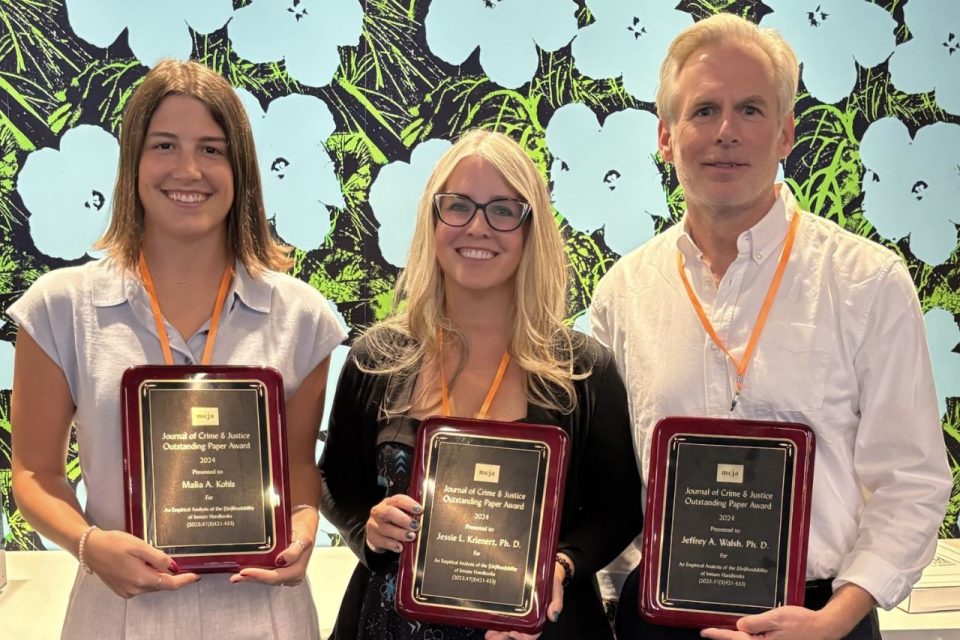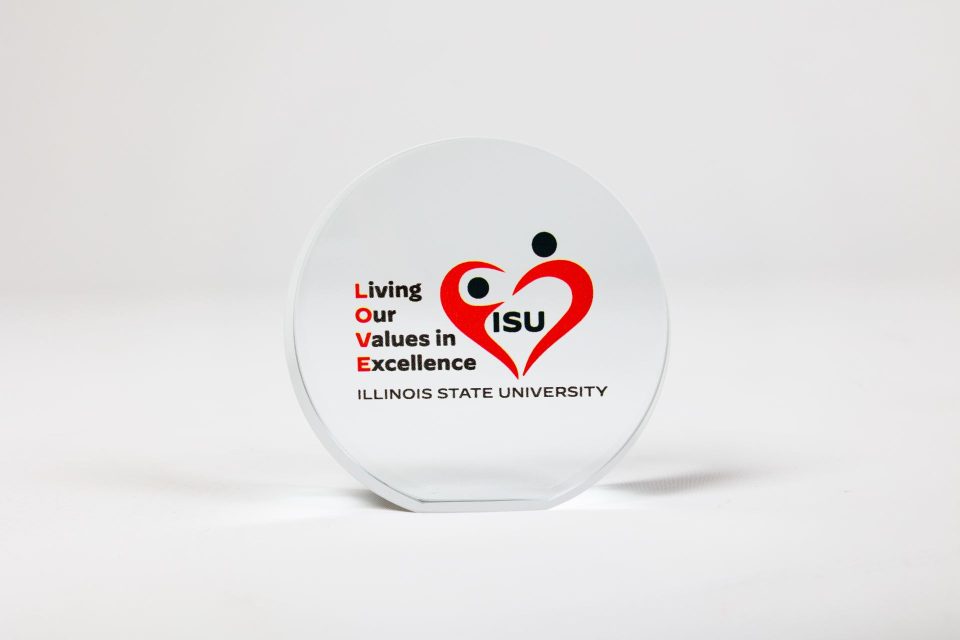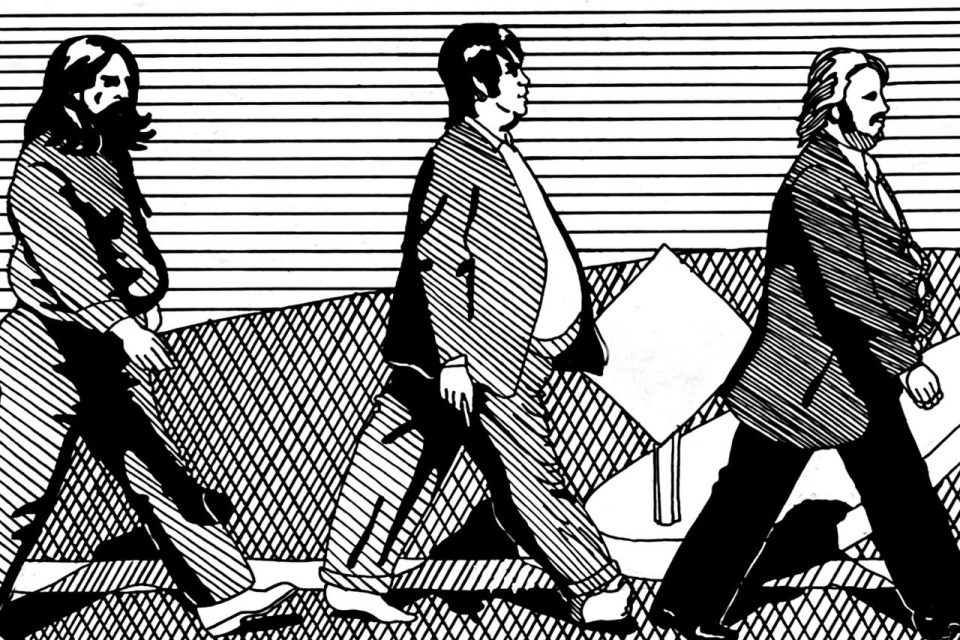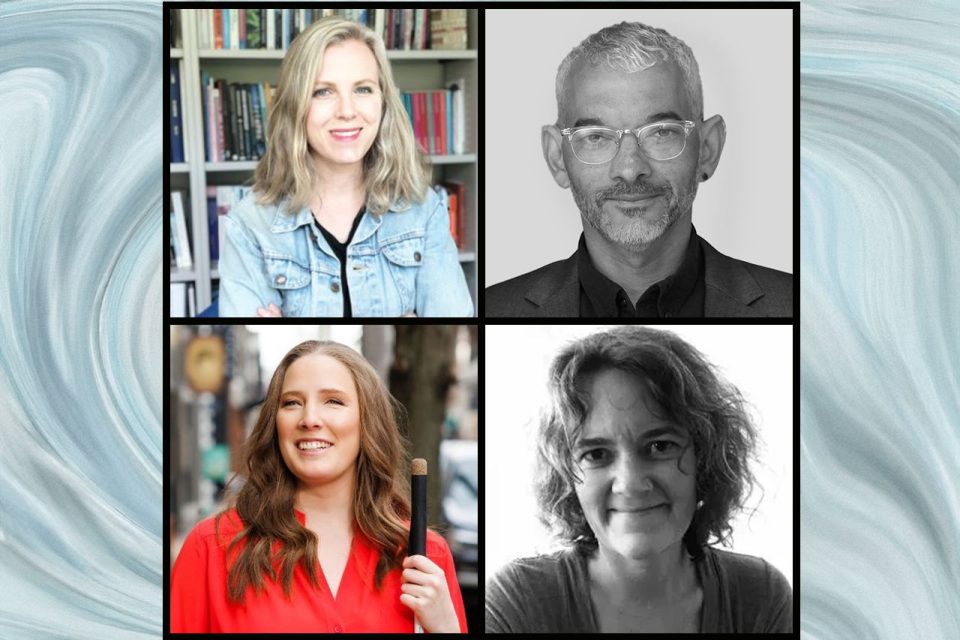Illinois State professors and alum honored with Outstanding Paper Award for groundbreaking study on inmate handbook readability
When Dr. Jessie Krienert and Dr. Jeffrey Walsh of Illinois State University’s Department of Criminal Justice Sciences, along with alum Malia Kohls, began collecting inmate handbooks for one of their research projects, they stumbled upon something that would spark a national conversation and earn them the 2025 Outstanding Paper Award from the Midwestern Criminal Justice Association’s Journal of Crime & Justice.
Their article, An Empirical Analysis of the (Un)Readability of Inmate Handbooks, co-authored by Illinois State alum Malia Kohls, revealed that most correctional handbooks across the United States are written at a college reading level, far beyond the literacy levels typical of incarcerated populations.
“The project actually began by accident,” Krienert explained. “We were collecting inmate handbooks for a different study when we noticed how difficult some of the language was to understand. That overlap with my work as IRB chair, where readability is crucial for consent forms, made us ask a simple question: ‘If readability matters in research ethics, shouldn’t it also matter in correctional communication?'”
The team analyzed 74 handbooks from 49 states using standard readability tools. What they found was troubling. The vast majority required advanced reading skills well above the fourth- to eighth-grade levels common among inmates.
“This mismatch isn’t just academic,” Walsh said. “It has real implications for fairness, safety, and accountability inside correctional institutions. People are being held responsible for rules they may not be able to comprehend.”
Overcoming barriers to access
Getting the handbooks was no small feat. Many correctional agencies do not make these documents public, forcing the researchers to navigate a web of follow-up emails, bureaucratic hurdles, and Freedom of Information Act requests. Despite some resistance, and even some unfulfilled requests, the team assembled one of the most comprehensive national samples of its kind.
Krienert and Walsh also credit Kohls, who joined the project as an undergraduate research assistant, with playing a pivotal role in collecting and analyzing data.
“Malia brought fresh insight and meticulous attention to detail,” Kriener said. “This collaboration shows how faculty-student partnerships can produce meaningful, applied research with real-world impact.”
Low-cost reforms, high-impact results
The professors emphasize that improving handbook readability doesn’t require major resources. Readability tools are already built into most word processors, and AI-based applications can highlight overly complex text.
“Improving accessibility is one of the simplest, lowest-cost reforms available,” Krienert said. “Small changes in language could prevent confusion, reduce disciplinary actions, and improve institutional safety.”
Continuing the work
The team’s research has already expanded. They have since published a related article examining Prison Rape Elimination Act (PREA) policies and are now evaluating how readable and accessible PREA information is on correctional websites. A new phase focuses on county jail handbooks to understand communication practices at the local level.
A message to future scholars
For Krienert and Walsh, the award is both validation and motivation.
“It’s gratifying to see a project that started with a simple question resonate across the field,” Krienert said. “Research on incarcerated populations is often overlooked, but it’s essential if we care about justice and equity.”
They also encourage other scholars to pursue work that bridges empirical research and practical reform, even when funding is limited or unavailable.
“Start with a real-world problem and let it guide the research,” Walsh said. “Sometimes the most impactful studies come from asking everyday questions that others haven’t thought to examine.”
The College of Applied Science and Technology celebrates Krienert, Walsh, and Kohls for their innovative, socially conscious research, work that not only shines a light on communication gaps in correctional systems but also points the way toward solutions that promote fairness, safety, and understanding.
Latest Publications
- Kristen Bernas Honored as First LOVE Award Recipient for Exemplary CollaborationIllinois State University proudly recognizes Kristen Bernas as the inaugural recipient of the Living Our Values in Excellence (LOVE) Award, a distinction that celebrates individuals who embody the University’s core values as outlined in Excellence by Design 2024–2030, the University’s strategic plan. Kristen, an office administrator in the Department of Accounting, was selected for her
- Make a lasting impact by mentoring a Redbird studentCareer Services invites you to join the Alumni Mentor Network, where your experience becomes a powerful tool for student success.
- Board of Trustees action items, October 17, 2025The Board of Trustees of Illinois State University approved several resolutions at its regular meeting on October 17, 2025.
- Queer Talks to explore Girth & Mirth clubs November 19Queer Coalition, Illinois State's sponsored LGBTQIA+ faculty, staff, and graduate student affinity group, invites the University community to attend a lunchtime presentation November 19 by Women's, Gender, and Sexuality Studies Program Interim Director Dr. Jason Whitesel on the history and visual representation of Girth & Mirth clubs from their advent in 1970s San Francisco through their last hurrah in the early 2000s. This event will take place from 11:30 a.m.-1 p.m. in 401 Stevenson Hall.
- Creatively critical tech virtual fall 2025 speaker seriesThis fall, the Creatively Critical Tech: Research + Practice + Design virtual speaker series will host four leading scholars whose work advances innovative and inclusive research, art, design, and practice with emerging technologies and media.
- Nominations open for 2026 Strand Diversity and staff awards through November 21Nominations are open through Friday, November 21, at 4:30 p.m., for the 2026 David A. Strand Diversity Achievement Award, Administrative/Professional and Civil Service Distinguished Service Awards, Administrative Professional Emerging Leader Award, Team Excellence Award, and the Environmental Stewardship Award.













